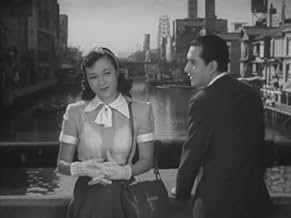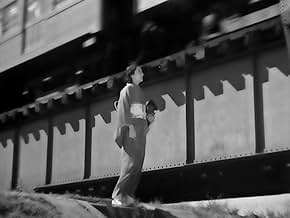Michiyo vit dans une petite maison à Osaka et n'est pas heureuse dans son mariage : tout ce qu'elle fait, c'est de cuisiner et laver le linge pour son mari.Michiyo vit dans une petite maison à Osaka et n'est pas heureuse dans son mariage : tout ce qu'elle fait, c'est de cuisiner et laver le linge pour son mari.Michiyo vit dans une petite maison à Osaka et n'est pas heureuse dans son mariage : tout ce qu'elle fait, c'est de cuisiner et laver le linge pour son mari.
- Réalisation
- Scénario
- Casting principal
- Récompenses
- 9 victoires au total
Avis à la une
There is a lovely bit of feminism in how this film shows how unfair traditional society is, with a woman expected to be subservient to a man's needs and put up with him staying out late getting drunk. Ironically, all of the friends of the wife (Setsuko Hara) tell her how lucky she must be being "happily married," while she suffers behind a smile or casting down her eyes. When they ask her what she talks about with him, she replies simply that she has a cat. While she carefully manages the household finances, he goes out and buys a fancy pair of shoes, seemingly oblivious. It's infuriating to watch, and when his spoiled niece (Yukiko Shimazaki) turns up looking for a place to stay, things get worse, as she now has two loafers around the house.
The scenes in Osaka that Naruse gives us are as beautiful as the two leading ladies, making the film a visual treat. There is also a depth of feeling to what Hara's character is going through, and that's what made the film for me. At the outset of the film she asks "I had hopes and dreams before. Where have they gone?" and "With a life restricted to the kitchen and the family room, must every woman grow old and die feeling empty?" It was liberating to see her take action and leave for Tokyo, not writing her husband (or sadly, being written to).
The husband (Ken Uehara) is a better person around his niece, and weirdly we see flirtation between the two, as well as a cousin of the wife's lightly hitting on her. They both know to draw the line at adultery though, and while the film is certainly showing the husband in a negative light, it seems to be saying more that these are two average, decent people in a marriage, and cautioning husbands to treat their wives better. Bravo for that, but at the same time, the "stand by your man" aspect definitely didn't work for me 70 years later. He's aware she's had a hard time, but not aware of his own role in that, and how he's taken her completely for granted. It makes for an unsatisfying finish, but for the things it was able to accomplish in 1951, I liked it.
Le saviez-vous
- AnecdotesThis film revived the shomingeki sub-genre in which lower middle class and struggling families are depicted.
- Citations
Michiyo Okamoto: [voiceover] My husband is sitting at the table. I bring a pot of miso soup from the kitchen. Yesterday, today, and tomorrow, for 365 days a year, morning and night, come and go unvaryingly. With a life restricted to the kitchen and the family room, must every woman grow old and die feeling empty?
- ConnexionsReferenced in Century of Cinema: Un siècle de cinéma japonais, par Nagisa Oshima (1995)
Meilleurs choix
Détails
- Durée1 heure 37 minutes
- Couleur
- Mixage
- Rapport de forme
- 1.37 : 1
Contribuer à cette page






























